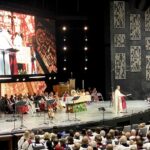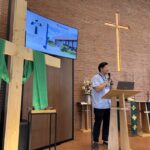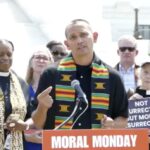|
Israel and its numerous Evangelical supporters are to blame for all the difficulties facing Palestinian Christians, according to a recent Christian conference held in Bethlehem.
“The Israeli occupation is a sin, if you don’t think it is a sin, you must think it is a blessing,” Dr. Yohanna Katanacho, co-author of Kairos Palestine, bluntly told the audience at Christ at the Checkpoint (CATC), where he was one of many conference speakers who criticized the Jewish state.
Sponsored by the Holy Land Trust and Bethlehem Bible College, the event featured prominent American evangelical speakers such as Tony Campolo, Ron Sider, Shane Claiborne, Joel Hunter and Lynne Hybels. Emphasizing non-violence against “the structural sin of occupation,” the event also served up a blistering critique of Christian Zionism at the March 5-9 gathering.
Identifying pro-Israel evangelicals as the lynchpin of American support for Israel, conference speakers pointed to Palestinian Christian suffering in an effort to reduce that support. Some pro-Israel evangelicals see the return of the Jewish people to their homeland as part of God’s redemptive plans for Israel.
Criticisms of Zionism met with applause and standing ovations from the nearly 600 mostly American conferees. The United Methodist General Board of Global Ministries (GBGM), Bread for the World, and Christian aid and development organization World Vision were among the groups with representatives on-hand.
Also attending the conference were a tour group of 35 students from the evangelical Wheaton College outside Chicago, led by Wheaton professor and longtime pro-Palestinian activist Gary Burge. Burge pointed to what he portrayed as examples of Israeli callousness, but when asked if his students had visited with the Palestinian group Hamas or an impoverished neighborhood where Jews and Arabs work together, Burge curtly replied “No.” The Wheaton professor’s tour echoed the wider CATC conference sentiments as it assigned blame for almost all Palestinian difficulties to Israel and its “occupation” of Palestinian territories.
The Palestinian Christians who opened the conference spoke candidly about the struggles facing many of those they served and ministered to. Two local pastors lamented the challenges of teaching from the Old Testament and the unique position of the Jewish people. While the bulk of the Palestinian speakers avoided making overly political statements, Dr. Jonathan Kuttab, Chairman of the Board for the Bethlehem Bible College, noted explicitly, “there is clear erosion to the point of collapse of support for a two state solution as an option to resolve this conflict.”
During a question and answer session Florida megachurch pastor Joel Hunter, described as a spiritual advisor to President Obama, was asked how he would advise Obama about the Arab-Israeli conflict.
“It is unlikely that he would ever ask me, but if he did, I would tell him to do as Jesus would do, as well as he knows Jesus,” Hunter replied. After describing President Obama’s conversion experience, Hunter added, “I would tell him further, God can guide you, God can lead you and this is not basically a political decision, it is basically a spiritual one so when you act and think like Jesus you will probably make the right decision.”
Much of the conference was devoted to an attack on Christian Zionism. Burge disputed that “Abrahamic DNA ensures property rights.” The Wheaton professor sought to deflect the label of Replacement Theology, which asserts Christianity completely replaced the Jews, for a more nuanced Fulfillment Theology: “Just as Jesus fulfills the Law and the Prophets, he fulfills the promises of the Land.”
“Jesus showed no interest in the land,” dismissed Manfred Kohl, a German theologian and executive for Overseas Council International. Describing how “in [the letters of] Paul, the land, like the Law, becomes irrelevant.” Kohl summarized his appraisal of Christian Zionism in his lecture title “Very Stupid, Very Ecstatic.”
Munther Isaac, CATC’s event director, lamented accusations of anti-Semitism when he spoke about his own struggles as a Palestinian: “To speak up about our struggles we become oppressors.”
“It is like being told, only after we speak about the wrongdoing around the world do I have the right to talk about my situation,” Isaac said, challenging what he said was the expectation to address all the injustices other peoples face.
As the lone Christian Zionist speaker, Pastor Wayne Hilsden of King of Kings Community in Jerusalem noted not all pro-Israel evangelicals are Christian Zionists. Hilsden recalled that many early church fathers and reformers saw the Jews returning to Israel as an important part of God’s redemptive plan for humanity.
“We know that God did not choose the Jewish people just to be a sermon illustration,” Hilsden offered. Doubtful of a political solution, the Jerusalem pastor advised that “We cannot put our hope in politicians and negotiated peace deals, our hope must be in Jesus Christ alone.”
Christian Zionism was repeatedly condemned by speakers as a source of Palestinian suffering. Some conspiratorially claimed that without the Christian Zionist lobby, Israel’s U.S. support would vanish. The Arabic translation of the conference goals said: “to challenge the Zionist ideology of Christian Zionist thought.” A pre-recorded interview showed a leading Egyptian pastor decrying how Christian Zionists hurt his church too.
The theme of non-violent peaceful resistance was urged by pacifist Ron Sider, President of Evangelicals for Social Action. Long an advocate for Christian Peacemaking Teams, Sider rebuked both Just War advocates and the pacifists for not taking their positions seriously.
“For the first time in human history, we should launch a carefully planned, well-funded campaign to test in real life how successful non-violence would be if we really got serious about it and really tried it on a large scale,” Sider suggested. “Unless we do that, both pacifist and Just War theorists blatantly ignore their own teaching.” Chiding his fellow pacifists, Sider noted, “We have long claimed that we have an alternative to war, but that claim remains empty unless we are willing to risk death like the soldiers do to stop injustice and work for peace.”
Organizers mostly left unexamined how Islam affects Palestinian Christians. Colin Chapman, author and expert in Islamic Studies, in his lecture “A Christian Response to Radical Islam,” largely called for empathy with Islamists.
“If Israel had complied with famous UN Resolution 242 in 1967, Hamas might never have come into existence,” Chapman claimed. “And if Israel had not invaded Lebanon in 1982, there might be no Hezbollah today.”
Chapman encouraged Western patience with Islamists because, “I think you will find that they are more pragmatic than you think.” Chapman was optimistic, highlighting the new Tunisian President’s decision not to ban bikinis and alcohol out of concern for tourism. Asked about Islamist attacks on Coptic Christians in Egypt, Colin was dismissive. “By asking the question in this way, it just shows to me you haven’t begun to put yourself in their shoes,” Chapman rebuked, immediately met with applause from the gathered audience.
The challenges facing Christians in the region are incredibly difficult. Blaming Israel for all difficulties is shortsighted. By ignoring the role of the Arab League, Islamists, the United Nations and other geo-political forces, the voices behind Christ at the Checkpoint will have left participating Christians with an incomplete picture, and one that could make already pro-Israel evangelicals dismissive of their position.
Related articles:
- Pentecostals Cast Critical Eye towards Israel
- Obama Mobilizes Religious Left Over Obamacare
- Liberal Religion Scholar Hopes for a “Religion-less Christianity”
No comments yet





Leave a Reply